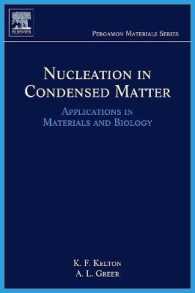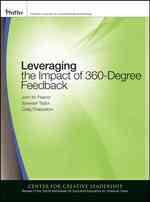- ホーム
- > 洋書
- > 英文書
- > Science / Mathematics
Full Description
Project Management in Construction adopts a systems approach to organisation analysis and design from the initial concept of the project. It is concerned particularly with the integration of the contributors to the process and the way in which decisions are made. Appropriately structured organisations are essential for the delivery of effective projects, the design of which requires an in-depth knowledge of organisation theory applied to the definition, design and construction of projects. The Fifth Edition addresses the increasing complexity facing major construction by examining advances in the major theoretical concepts underlying project management, together with practical developments such as supply chain management. New ideas such as chaos and complexity theory are examined in the context of construction project management, and aspects of organisation theory, such as trust and hierarchy, have been further developed. The topic of sustainability is discussed as a powerful new environmental force impacting on both the project management process and the industry and its clients.
Contents
1 Relevance of organisation structure. Introduction. Management and organisation. Definition of construction project management. Objectives and decisions. The project management process and the project manager. Projects, firms and clients. The contribution of organisation structure. Organisation theory and project organisations. Project organisation in context. 2 Evolution of project organisation. Introduction. Origins. A perspective of contemporary influences. Relevance of systems theory. 3 Organisation and the Construction Process. Introduction. The classical approach. The behavioural approach. The socio-technical approach. The systems approach. Criticisms of the systems approach. Mintzberg's classification. Chaos and complexity theory. Postmodernism. Critical theory. The transaction cost approach. Projects, firms and process. 4 Systems thinking and construction project organisation. Introduction. Systems concepts. Action of environmental forces. Negative entropy, adoption and protected environment. Growth, differentiation, interdependency and integration. Feedback. Systems and hierarchies. 5 The client. Introduction. Classification of clients. Clients' objectives. Relationship of the client's organisation and the construction process. Conflicting objectives. Project change. Role of the client. Clients and sustainability. Clients and projects. 6 The project team. The firms. Relationship with the client. Differentiation, interdependency and integration. Decisions and their effect on structure. Differentiation and integration in practice. Organisational culture. Partnering. Supply chain management. Trust between construction organisations generally. 7 A model of the construction process. Introduction. Common characteristics. Sub-systems. The operating system and the managing system. The functions of the managing system. Pattern of managing system functions. Project management activities. Project management skills. Some practical considerations. Design of organisation structures. 8 Authority, Power and Politics. Introduction. Authority. Power. Relationship between authority and power. The sources of power. Power and interdependency. Politics in organisations. Power and leadership. Empowerment. Power in project management. Politics, projects and firms. Empowerment and projects. Project managers and power. 9 Project leadership. Introduction. Leadership. Some research models. Leadership style. Transactional and transformational leadership. Leadership and the project manager. Project managers' perceptions. Leadership qualities. 10 Organisation structures. Introduction. Project management theory and transaction cost economics. The components and project organisation structures. Client/project team integration. Design team organisation. Integration of the construction team. An illustration of a transaction cost explanation. Organisation matrix. Public-private partnerships. Programme management. 11 Analysis and design of project management structures. Need for analysis and design. Criteria. Linear responsibility analysis and other techniques. Application of linear responsibility analysis. Project outcome. Presentation of project organisations. References. Index








